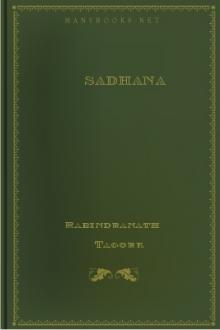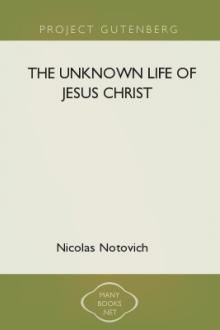Sadhana - Rabindranath Tagore (book club suggestions txt) 📗

- Author: Rabindranath Tagore
- Performer: -
Book online «Sadhana - Rabindranath Tagore (book club suggestions txt) 📗». Author Rabindranath Tagore
In fact, these undulations and vibrations, these risings and fallings, are not due to the erratic contortions of disparate bodies, they are a rhythmic dance. Rhythm never can be born of the haphazard struggle of combat. Its underlying principle must be unity, not opposition.
This principle of unity is the mystery of all mysteries. The existence of a duality at once raises a question in our minds, and we seek its solution in the One. When at last we find a relation between these two, and thereby see them as one in essence, we feel that we have come to the truth. And then we give utterance to this most startling of all paradoxes, that the One appears as many, that the appearance is the opposite of truth and yet is inseparably related to it.
Curiously enough, there are men who lose that feeling of mystery, which is at the root of all our delights, when they discover the uniformity of law among the diversity of nature. As if gravitation is not more of a mystery than the fall of an apple, as if the evolution from one scale of being to the other is not something which is even more shy of explanation than a succession of creations. The trouble is that we very often stop at such a law as if it were the final end of our search, and then we find that it does not even begin to emancipate our spirit. It only gives satisfaction to our intellect, and as it does not appeal to our whole being it only deadens in us the sense of the infinite.
A great poem, when analysed, is a set of detached sounds. The reader who finds out the meaning, which is the inner medium that connects these outer sounds, discovers a perfect law all through, which is never violated in the least; the law of the evolution of ideas, the law of the music and the form.
But law in itself is a limit. It only shows that whatever is can never be otherwise. When a man is exclusively occupied with the search for the links of causality, his mind succumbs to the tyranny of law in escaping from the tyranny of facts. In learning a language, when from mere words we reach the laws of words we have gained a great deal. But if we stop at that point, and only concern ourselves with the marvels of the formation of a language, seeking the hidden reason of all its apparent caprices, we do not reach the end—for grammar is not literature, prosody is not a poem.
When we come to literature we find that though it conforms to rules of grammar it is yet a thing of joy, it is freedom itself.
The beauty of a poem is bound by strict laws, yet it transcends them. The laws are its wings, they do not keep it weighed down, they carry it to freedom. Its form is in law but its spirit is in beauty. Law is the first step towards freedom, and beauty is the complete liberation which stands on the pedestal of law.
Beauty harmonises in itself the limit and the beyond, the law and the liberty.
In the world-poem, the discovery of the law of its rhythms, the measurement of its expansion and contraction, movement and pause, the pursuit of its evolution of forms and characters, are true achievements of the mind; but we cannot stop there. It is like a railway station; but the station platform is not our home. Only he has attained the final truth who knows that the whole world is a creation of joy.
This leads me to think how mysterious the relation of the human heart with nature must be. In the outer world of activity nature has one aspect, but in our hearts, in the inner world, it presents an altogether different picture.
Take an instance—the flower of a plant. However fine and dainty it may look, it is pressed to do a great service, and its colours and forms are all suited to its work. It must bring forth the fruit, or the continuity of plant life will be broken and the earth will be turned into a desert ere long. The colour and the smell of the flower are all for some purpose therefore; no sooner is it fertilised by the bee, and the time of its fruition arrives, than it sheds its exquisite petals and a cruel economy compels it to give up its sweet perfume. It has no time to flaunt its finery, for it is busy beyond measure. Viewed from without, necessity seems to be the only factor in nature for which everything works and moves. There the bud develops into the flower, the flower into the fruit, the fruit into the seed, the seed into a new plant again, and so forth, the chain of activity running on unbroken. Should there crop up any disturbance or impediment, no excuse would be accepted, and the unfortunate thing thus choked in its movement would at once be labelled as rejected, and be bound to die and disappear post-haste. In the great office of nature there are innumerable departments with endless work going on, and the fine flower that you behold there, gaudily attired and scented like a dandy, is by no means what it appears to be, but rather, is like a labourer toiling in sun and shower, who has to submit a clear account of his work and has no breathing space to enjoy himself in playful frolic.
But when this same flower enters the heart of men its aspect of busy practicality is gone, and it becomes the very emblem of leisure and repose. The same object that is the embodiment of endless activity without is the perfect expression of beauty and peace within.
Science here warns us that we are mistaken, that the purpose of a flower is nothing but what is outwardly manifested, and that the relation of beauty and sweetness which we think it bears to us is all our own making, gratuitous and imaginary.
But our heart replies that we are not in the least mistaken. In the sphere of nature the flower carries with it a certificate which recommends it as having immense capacity for doing useful work, but it brings an altogether different letter of introduction when it knocks at the door of our hearts. Beauty becomes its only qualification. At one place it comes as a slave, and at another as a free thing. How, then, should we give credit to its first recommendation and disbelieve the second one?
That the flower has got its being in the unbroken chain of causation is true beyond doubt; but that is an outer truth. The inner truth is: Verily from the everlasting joy do all objects have their birth. [Footnote: Anandadhyeva khalvimani bhutani jayante.]
A flower, therefore, has not its only function in nature, but has another great function to exercise in the mind of man. And what is that function? In nature its work is that of a servant who has to make his appearance at appointed times, but in the heart of man it comes like a messenger from the King. In the Ramayana, when Sita, forcibly separated from her husband, was bewailing her evil fate in Ravana’s golden palace, she was met by a messenger who brought with him a ring of her beloved Ramachandra himself. The very sight of it convinced Sita of the truth of tidings he bore. She was at once reassured that he came indeed from her beloved one, who had not forgotten her and was at hand to rescue her.
Such a messenger is a flower from our great lover. Surrounded with the pomp and pageantry of worldliness, which may be linked to Ravana’s golden city, we still live in exile, while the insolent spirit of worldly prosperity tempts us with allurements and claims us as its bride. In the meantime the flower comes across with a message from the other shore, and whispers in our ears, “I am come. He has sent me. I am a messenger of the beautiful, the one whose soul is the bliss of love. This island of isolation has been bridged over by him, and he has not forgotten thee, and will rescue thee even now. He will draw thee unto him and make thee his own. This illusion will not hold thee in thraldom for ever.”
If we happen to be awake then, we question him: “How are we to know that thou art come from him indeed?” The messenger says, “Look! I have this ring from him. How lovely are its hues and charms!”
Ah, doubtless it is his—indeed, it is our wedding ring. Now all else passes into oblivion, only this sweet symbol of the touch of the eternal love fills us with a deep longing. We realise that the palace of gold where we are has nothing to do with us—our deliverance is outside it—and there our love has its fruition and our life its fulfilment.
What to the bee in nature is merely colour and scent, and the marks or spots which show the right track to the honey, is to the human heart beauty and joy untrammelled by necessity. They bring a love letter to the heart written in many-coloured inks.
I was telling you, therefore, that however busy our active nature outwardly may be, she has a secret chamber within the heart where she comes and goes freely, without any design whatsoever. There the fire of her workshop is transformed into lamps of a festival, the noise of her factory is heard like music. The iron chain of cause and effect sounds heavily outside in nature, but in the human heart its unalloyed delight seems to sound, as it were, like the golden strings of a harp.
It indeed seems to be wonderful that nature has these two aspects at one and the same time, and so antithetical—one being of thraldom and the other of freedom. In the same form, sound, colour, and taste two contrary notes are heard, one of necessity and the other of joy. Outwardly nature is busy and restless, inwardly she is all silence and peace. She has toil on one side and leisure on the other. You see her bondage only when you see her from without, but within her heart is a limitless beauty.
Our seer says, “From joy are born all creatures, by joy they are sustained, towards joy they progress, and into joy they enter.”
Not that he ignores law, or that his contemplation of this infinite joy is born of the intoxication produced by an indulgence in abstract thought. He fully recognises the inexorable laws of nature, and says, “Fire burns for fear of him (i.e. by his law); the sun shines by fear of him; and for fear of him the wind, the clouds, and death perform their offices.” It is a reign of iron rule, ready to punish the least transgression.
Yet the poet chants the glad song, “From joy are born all creatures, by joy they are sustained, towards joy they progress, and into joy they enter.”
The immortal being manifests himself in joy-form. [Footnote: Anandarupamamritam yad vibhati.] His manifestation in creation is out of his fullness of joy. It is the nature of this abounding joy to realise itself in form which is law. The joy, which is without form, must create, must translate itself into forms. The joy of the singer





Comments (0)